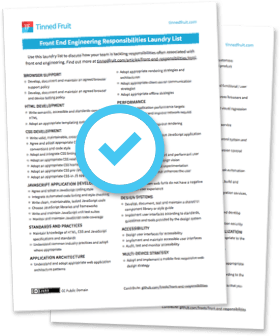Positioning for front-end developers
In last week’s email we looked at the relationship between internet-famous technical experts, practitioner generalist developers, and our ultimate customers - the organisations who we build products for.
Although we might aspire to be an anointed industry expert, this is actually an unusual way to a successful career.
Technical experts have taken a risky gamble that pays off only with a lot of hard work, and probably some luck.
A technical expert uses horizontal positioning to market their skills via conference talks, workshops, articles and courses.
Horizontal positioning has nothing to do with taking a nap or any… other activities. It is a claim to a deeply specialised knowledge and expertise that can apply across a range of industries and sectors.
For example, someone who has very deep knowledge of React can apply that knowledge to develop React apps for any number of industries.
This is why the examples used for public learning materials are usually watered down to vanilla ‘to do’ apps - i.e. a business productivity app that is broadly understandable by everyone. It allows the technical concepts to be taught without having to also teach a lot of industry-specific knowledge.
As hands-on generalist developers, we then have to orchestrate our own expertise and apply it to solve a specific set of problems in order to create and maintain a coherent product for real users.
In other words, this horizontal, generalised technical expertise only takes you so far.
The world’s most knowledgeable React expert would still need skills and experience in applying their knowledge to real world software-engineering problems to be successful within a product development team.
Vertical positioning, by contrast, is a claim to expertise within an industry, sector or audience.
In my own career, I have worked with a few different TV broadcasting companies in the UK. While I was busy applying my technical web development expertise, I hardly noticed that I was also picking up a lot of transferable knowledge and experience of how TV broadcasting companies operate, and specifically, how they use the web to support and augment their business.
I’ve also spent some time working in government, entertainment, charity, SaaS, publishing, culture and event-management sectors.
It can be hugely rewarding to learn about each of these business types as you go along. But it comes at a cost: my generalised web development skills were (and still are) a commodity. I was not adding anything beyond my technical skills, so I was treated as a replaceable part, and had little say over how what I was doing would support business goals.
When I switched from one TV company to another, I hardly noticed that the new company were not really interested in me for my web development expertise, which was plentifully available as a high-profile organisation. They were far more interested in my specific TV broadcasting industry experience.
This meant I could start contributing meaningfully to the whys of each project and not just the hows.
Which is much, much more valuable.
My colleagues that still work in TV have either worked their way up through promotions, or are contracting at premium rates. All because they specialise in work for TV companies.
This is quite different to what many developers do.
We’re too used to thinking about our horizontally-positioned technical expertise as the only thing that has value.
So we switch jobs to completely different industries without realising that we’re ignoring our hard-won vertical expertise in the process.
Your industry expertise is incredibly valuable, because it is far harder to come by. There are no tutorials, workshops or books that will teach it effectively. You have to do it, and learn as you go.
For today’s exercise, I want you to reply to this message and answer this question:
What bit of industry-specific knowledge have you used to do your job better recently?
Best wishes,
– Jim
